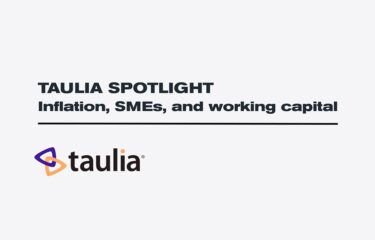
Blog
Expert Advice
8 min read
14 Dec 2022


Blog
Expert Advice
8 min read
14 Dec 2022

With inflation reaching levels not seen for many decades, businesses face significant challenges –making it more important than ever to manage cash flow effectively.
Several factors contributed to the high inflation currently experienced by major economies including the USA and the UK. The response to the global pandemic from March 2020 onwards required many people to stay at home, which not only prompted individuals to postpone spending decisions but also caused major logistical problems for businesses worldwide.
Following significant economic stimulus and the lifting of restrictions, the resulting surge in demand outstripped supply, while supply chains continued to be affected by bottlenecks. And in recent months, disruption caused by the war in Ukraine has led to further fuel and food shortages.
Governments have relatively few tools at their disposal when it comes to controlling inflation. The most significant is contractionary monetary policy – in other words, reducing the rate of monetary expansion by increasing interest rates, thereby encouraging people to save, and discouraging them from borrowing and spending. Central banks can also attempt to slow growth by offering government securities at rates likely to outperform the stock market.
Despite these levers, inflation is often relatively persistent. In the short term, at least, there’s little that can be done to reduce it. That means companies are forced to adapt, at least temporarily, to the changing economic landscape. Part of that adaptation is a renewed focus on resilience – aiming to ensure the survival of the business through a particularly challenging period.
Cash flow shortages are the most common reason why businesses fail – and as such, optimizing the rate at which money flows into and out of the business is key to mitigating the worst effects of inflation. Early payment programs are one method businesses can use to improve their cash flow management capabilities.
Here’s an overview of how inflation affects early payment programs, and their potential benefits.
Earning potential is one of the fundamental aspects of capital. Cash that’s held by a business has value because it can be used to capture interest, yield, or stock appreciation, or alternatively to fuel growth. This implicitly means that cash has greater value to a business today than if received at a future date. The sooner it’s able to be put to use in a working capital management strategy, the more it can return.
In times of high inflation, the potential value of cash is consistently eroded over time by its decreasing purchasing power. This means that the longer a business must wait for payment, and therefore to receive the capital they are due, the less it’s worth when they can use it.
As such, pre-existing payment agreements can present challenges in an inflationary environment. Lengthy payment terms can devalue transactions for both suppliers and buyers, depending on when payments are made. And the impact can be significant: losing even 2% on the value of a transaction over the payment term can be damaging when extrapolated to a large scale.
Early payment discounts offer both buyers and suppliers a way to benefit from the prompt or early settlement of invoices:
On another note, early payment programs can also strengthen the relationship between a buyer and supplier. In turn, stronger relationships improve the resilience of the entire supply chain. This is again particularly important in an economic environment characterized by uncertainty and the potential for disruption to supply or demand.
In an inflationary environment, supply chain solutions can help companies increase or optimize their working capital without having to seek financing from banks. While different solutions work in different ways, they can all generally offset some of the most damaging inflationary pressures by giving businesses the ability to make better use of their cash. This is usually through the acceleration of payment or the capture of discounts.
Many supply chain solutions also leverage the higher creditworthiness of the larger company in the buyer-supplier relationship, giving smaller businesses access to funding at a lower cost than they would otherwise be able to secure themselves. This gives these businesses the opportunity to mitigate the effects of high-interest rates, a core element of the risk-averse lending environment inflation often triggers.
Supply chain solutions that can be used to improve cash flow in times of high inflation include:
Dynamic discounting enables suppliers to receive payment for invoices earlier than the due date established through payment terms, in exchange for a variable discount. Generally speaking, the earlier the payment is received, the greater the discount offered.
Along with accelerating the collection of receivables for the supplier in the relationship, dynamic discounting also allows buyers to capture a risk-free discount on their invoices. This can represent the best use of their working capital, allowing them to reliably offset inflationary pressures by decreasing costs.
Supply chain finance – also known as supplier finance or reverse factoring – is another financing solution in which suppliers can receive early payment on outstanding invoices. However, unlike other solutions, supply chain finance programs are set up by the buyer rather than by the supplier.
Through supply chain finance, buyers access funding from a third-party finance provider to pay invoices early and capture any available discounts. Unlike self-funded dynamic discounting, this allows them to retain more of their own working capital which can also be put to good use. Suppliers in the arrangement also benefit by receiving payments more quickly, giving them the opportunity to deploy it to capture a return.
Accounts receivable (AR) financing is an arrangement whereby a supplier company receives funding from a third party in return for a portion of its accounts receivable. They essentially sell their invoices to this third party, giving them the chance to access the capital tied up in their receivables. This allows them to deploy that capital earlier, thereby improving their cash flow in the short term.
In general, businesses that meet the required criteria can find it easier to obtain funding from AR financing than from other types of capital financing. This is especially true for smaller businesses. In an inflationary environment, this can be a valuable tool for suppliers seeking to improve their cash flow.
Inventory management is the set of processes that businesses use to track and manage their inventory. Inventory in this context can mean raw materials, works-in-progress, and finished goods. Overseeing the journey that inventory takes – from the purchase of raw materials to the production, storage, and eventual sale of the finished product – inventory management allows companies to get a more accurate view of their supply chain.
This provides an immediate benefit, helping businesses mitigate the effects of inflation by identifying the shortfalls and shortages in the supply chain and seeking efficiency-driving improvements. Separate from that, inventory management software can also empower companies to better forecast inventory requirements, meaning they can make better purchasing decisions.
The most obvious of these is that they can purchase goods at today’s prices to fulfill immediate and expected demand, mitigating the depreciation of their capital. Many inventory management solutions also open up the benefits of Vendor Managed Inventory (VMI), empowering buyers to hold stock for later sale without significantly increasing their inventory-carrying costs.
High inflation is set to be the standard globally for the foreseeable future. Now is the best time for businesses to investigate alternative methods for managing their working capital. Dynamic discounting solutions, supply chain finance programs, accounts receivable financing programs, and inventory management software all offer potential working capital benefits. The choice is yours as to how you use them to optimize your cash flow and seek better returns from your capital.
If you’d like to discuss your options, contact us and one of our experts will be in touch.


Industry
Higher interest rates may come as a welcome development where investments are concerned – but how do interest rates affect…

Expert Advice
Taulia presents an exciting and educational conversation around some of the critical considerations being discussed in finance today.